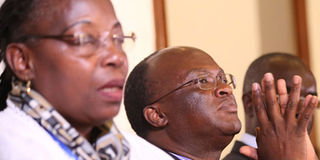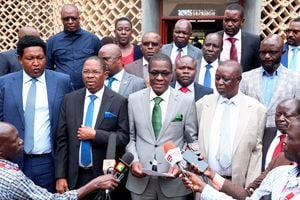Doctors protest over ‘casual’ Ebola screening

Health Cabinet Secretary James Macharia (centre). Three foreign citizens have caused fears of possible Ebola cases in Nairobi after they were admitted to hospitals in the city. PHOTO | BILLY MUTAI |
What you need to know:
- Ebola was taken to Nigeria by one air passenger on July 25. So far Nigeria has reported three deaths and more than 10 infections in Lagos, a bustling city of 20 million.
- At JKIA, Health Cabinet Secretary James Macharia said two medical specialists will this morning be sent to Liberia and Freetown in West Africa to gather more facts on the disease.
Doctors Thursday criticised Ebola screening at the country’s entry points, describing it as “casual”.
The Kenya Medical Association demanded that screening measures be tightened at the Jomo Kenyatta International Airport and all border points to ensure that the deadly Ebola virus does not gain entry into the country.
The medics’ response came as Kenya Airways announced it will continue flights into Ebola-hit countries in West Africa, on the advice of the government and international agencies.
President Uhuru Kenyatta supported KQ’s position and ordered Kenyan doctors to be sent to West Africa to take part in the screening of passengers before boarding.
On Wednesday, the WHO said Kenya was at a heightened risk of transmission because it handles more than 70 flights from West Africa every week.
Ebola was taken to Nigeria by one air passenger on July 25. So far Nigeria has reported three deaths and more than 10 infections in Lagos, a bustling city of 20 million.
Thursday, the President sought to widen the scope of Ebola surveillance by reaching out to Uganda, Ethiopia and Rwanda to work together to stop the spread of the lethal killer which has claimed the lives of more than 1,000 people in Sierra Leone, Guinea, Liberal and Nigeria.
Guinea has declared Eobla an emergency as more flights to the region were cancelled in the face of the panic caused by the incurable disease.
Thursday KMA chairman, Dr Elly Opot complained that the ongoing screening measures at Jomo Kenyatta International Airport have remained “casual” and there is need to have tighter measures.
“It is a matter of great concern that the World Health Organisation (WHO) has just classified Kenya as a high risk transmission zone given the casualness at JKIA and other ports of entry. Preventive measures will be key,” Dr Opot said.
Dr Opot — who was with vice-chairperson, Dr Elizabeth Wala and Nairobi Division chairman, Dr Abdi Mohamed — emphasised the need for improved public awareness and greater investment in protective gear for health workers.
“We want to question if the 30 isolation beds set up at Kenyatta National Hospital are really enough. That and the 100 health workers who have been trained on Ebola in a country of this size, for sure that is not enough,” he added.
Meanwhile, Public Health Society of Kenya (PHSK) chairman, Dr Peter Cherutich, also urged the Government to intensify screening at appropriate ports of entry.
He called for a public information campaign telling Kenyans about the symptoms of Ebola and how to prevent infection.
“This would avoid the misconceptions and myths circulating in various social media at the moment,” he explained, adding that WHO should speed up access to the experimental drugs for African countries.
The WHO Thursday issued a statement clarifying that Kenya was not among Ebola affected countries as had been portrayed by sections of the media.
The Daily Nation, however, was correct in its reflection of the statement which said Kenya and other African countries were in category two which means they are a high risk area of transmission.
At JKIA, Health Cabinet Secretary James Macharia said two medical specialists will this morning be sent to Liberia and Freetown in West Africa to gather more facts on the disease.
“We have to be sure by having facts from the source. We are sending those two doctors there for additional reassurance that we can actually rely on information coming from that place,” he said.
The government, he added, had formed a crisis management committee to handle complaints and challenges of screening passengers.
The 12-member team is led by Kenya Airports Authority chief Lucy Mbugua and includes members from Kenya Airways, Ministry of Health, Immigration department and the Interior Ministry.
The announcement by Mr Macharia followed pressure from medics, politicians and the general public over the way the government was handling measures aimed at preventing Ebola from reaching the country.
The airline’s chief executive Titus Naikuni told reporters that KQ would not suspend flights because international organisations and the government had said it was safe to fly to the Ebola-hit countries.
“In view of the advice, the management of Kenya Airways does not see a major risk that warrants stopping operations.
This means we will continue with our flights while reviewing the position on a daily basis,” he said.
Responding to concerns as to whether KQ was focusing on its own financial health at the expense of the safety of the whole country, Mr Naikuni agreed that the revenue the airline gets from its 44 weekly flights to West Africa was significant but added that it could not make up for a quarter of the earnings from its entire fleet.
“Kenya Airways is a responsible corporate citizen. We will not in anyway put this country to danger either by our operations or through collusion.” he said.
Reports by Mike Mwaniki, Aggrey Mutambo and Bernard Namunane




